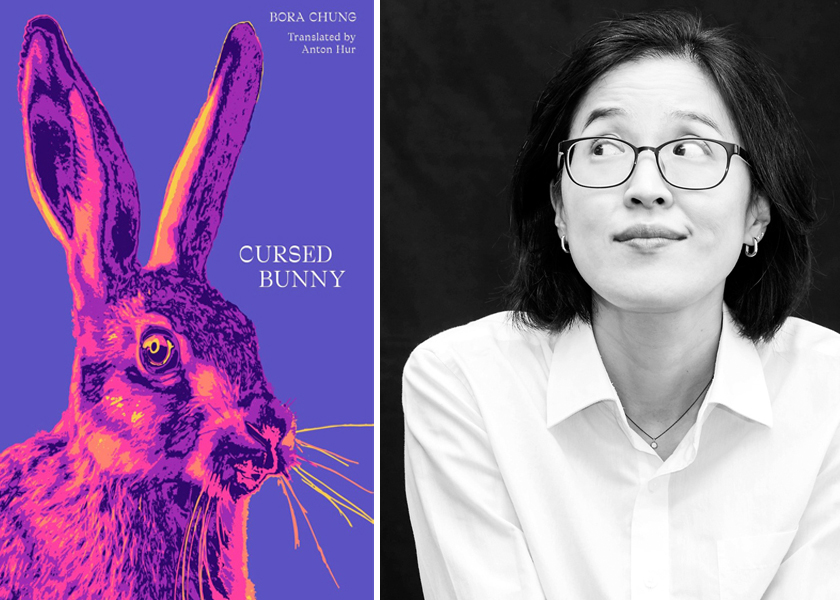Cursed Bunny ~ By Bora Chung
(Algonquin Books, Chapel Hill, 2021, ISBN #978-1-6437-5360-7)
Review by Bill Drucker (Winter 2025)

There is a morbid nonchalance that runs through the stories by Bora Chung. Disturbingly strange, oddly humorous, and even gross, this is an amazing collection of 10 surreal, fantastic, and inventive short stories. With sardonic wit, the author jumps the traditional literary norms and explores the outer boundaries of storytelling.
Chung is such a seductive writer. She pulls the reader in with a “Once upon a time” hook and assaults with wildly imaginative twist and turns. While there are stories based in Korea, none are folksy. Her stories carry a mood more like a modern Grimm Brothers tale. Drawing on her Korean background and East European education in Russian and Slavic languages and literature, Chung creates dark, moody settings and sets a tone of anxiety. The stories range from horrific to absurdist.
In Reunion, a young Korean student meets an old acquaintance on a return visit to Poland to do post-grad studies. Polish language is written into the dialogue between the two former students and lovers. The Korean student has a grant to do post-grad studies in Poland. Though the funding barely covers her cost of living, she goes anyway. There are some personal issues, chiefly that her mother as been forging her name on loans.
Old feelings surface between the two former friends. They connect as two damaged individuals. His emotional baggage extends back to the ghosts of World War II, a cruel childhood, and an unfocused adulthood. When she first chose to be intimate with him, she discovers his sexual need to be tied up. A small fetish, just a game really.
After they are reunited, she finds that it has become more of a self-destructive obsession. Little else has changed for him. He still lives in the same apartment. One morning she finds him hanged in the bathroom. He isn’t dead, but she feels that he may repeat the same act in the future. She stands in the bathroom, as if waiting to be released from her own ties.
The title story, Cursed Bunny deals with revenge fetish. A grandfather narrates the tale to his grandson. A Korean artisan creates a special curse fetish to take revenge on an unscrupulous businessman. It is a cursed bunny lamp. By accident the lamp is stored away. Revenge seems to have missed its intended target.
The curse is re-deployed when the CEO’s grandson finds and begins to use the bunny lamp. Ghost rabbits appear and chew up valuable documents, eventually destroying the lives of the CEO, his business and his family. Retribution comes with a heavy cost. The curse unfortunately does not just affect the victim; it spreads like a virus to everyone who has been in contact with the curse.
While Cursed Bunny deals with retribution, the story, Embodiment addresses gender issues, health and medical practices. In this misogynistic tale, a young woman’s monthly cycle won’t stop. She sees a male gynecologist, who finds nothing wrong and asks if she is experiencing undue stress. He prescribes birth control pills. With no relief after a month, she gets tested and is told she’s pregnant. She loses control of her life as her doctors and family take over. She is forced to go on blind dates, as the family tries to avoid social humiliation and get her married off before the baby comes. She meets a kind but shy ambulance driver, an extortionist, and a sympathetic old man. In chaos and stress, she goes into labor.
The Head (winner the 1998 Yonsei Literary Prize) is a truly bizarre and darkly humorous tale. A blob from the toilet calls out “Mother, mother” to the woman of the house. A yellow, gray blob with a slit for a mouth appears and talks to the woman. She quickly flushes the toilet. The head keeps reappearing after the housewife uses the toilet. With each visit, it manages to keep the woman’s attention a little longer. The head seems a little larger and more articulate every time.
Soon the head is talking to her daughter. The woman finds it all so strange and stressful, she moves the family to a new place. There is a period of respite. Then the head appears at the new home. One night, the woman goes to the toilet. She flushes and puts the lid down. There is a clack from the toilet as a wet hand pushed the lid up. Another limb appears as the woman looks from the mirror. The full, naked body stands before the woman, a younger version of herself. It asks for the woman’s clothes. The housewife realizes its not just the clothes the creation of her bodily waste is demanding.
In Scar, a nameless boy is kidnapped and chained to a rock in a cave. He is the sacrificial offering to a monster. The monster doesn’t devour the boy, but it siphons his vitality for years. When the boy escapes, his freedom is cut short. He is captured by ruthless people who exploit him in a kind of human slavery as a bare-knuckle fighter. Somehow he survives this imprisonment and wanders into a village. The whole town is dead, as if its vitality has been sapped.
Chung tells tales of animal cruelty, human exploitation, corporate greed, and other destructive forces with motives of exploitation and revenge. There is no normal carriage of justice in this writer’s surreal world.
Author Bora Chung has written three novels and three short story collections. She teams up with award-winning translator Anton Hur for this collection. Hur is from Stockholm, and currently lives in Seoul. Chung was educated in the U.S., earned an M.A. in Russian studies at Yale, and a Ph.D. in Slavic literature at Indiana University. She once taught Russian at Yonsei University. Aside from writing creative stories, Chung also translates Slavic literature into Korean.


